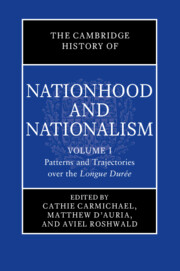Book contents
- The Cambridge History of Nationhood and Nationalism
- The Cambridge History of Nationhood and Nationalism
- The Cambridge History of Nationhood and Nationalism
- Copyright page
- Contents
- Figures
- Contributors
- General Introduction
- Part i The Politics of Ethnicity, Nationhood, and Belonging in the Settings of Classical Civilizations
- 1 Nationality and Ethnicity in the Ancient Near East
- 2 Nationhood: Was There Such a Thing in Antiquity?
- 3 The Holy Roman Empire
- 4 Ancient China
- 5 Politicized Ethnicity in Precolonial Southeast Asia
- 6 “India” before the Raj: Space and Identity in South Asian History
- Conclusion to Part I
- Part ii Paradigm Shifts and Turning Points in the Era of Globalization, 1500 to the Present
- Index
- References
4 - Ancient China
from Part i - The Politics of Ethnicity, Nationhood, and Belonging in the Settings of Classical Civilizations
Published online by Cambridge University Press: 27 October 2023
- The Cambridge History of Nationhood and Nationalism
- The Cambridge History of Nationhood and Nationalism
- The Cambridge History of Nationhood and Nationalism
- Copyright page
- Contents
- Figures
- Contributors
- General Introduction
- Part i The Politics of Ethnicity, Nationhood, and Belonging in the Settings of Classical Civilizations
- 1 Nationality and Ethnicity in the Ancient Near East
- 2 Nationhood: Was There Such a Thing in Antiquity?
- 3 The Holy Roman Empire
- 4 Ancient China
- 5 Politicized Ethnicity in Precolonial Southeast Asia
- 6 “India” before the Raj: Space and Identity in South Asian History
- Conclusion to Part I
- Part ii Paradigm Shifts and Turning Points in the Era of Globalization, 1500 to the Present
- Index
- References
Summary
Through much of the twentieth and well into the twenty-first century, scholars in China and in the West debated the nature of Chinese nationhood. In the West, the once dominant view was promulgated by Joseph R. Levenson and like-minded scholars, who depicted Chinese identity in terms of “culturalism,” that is belonging to a universalizing and inclusive civilization, defined by a common Confucian culture. A concept of national identity conceived in ethnic or racial terms was considered a modern phenomenon, closely related to China’s entrance into the world of nation-states.1 In the last decades of the twentieth century, though, this view was criticized by scholars who demonstrated the existence of traits of exclusive ethnocentric Chinese identity back in the past. Some went as far as to postulate racism as pertinent to Chinese civilization from its earliest stages.2
- Type
- Chapter
- Information
- The Cambridge History of Nationhood and Nationalism , pp. 76 - 95Publisher: Cambridge University PressPrint publication year: 2023

